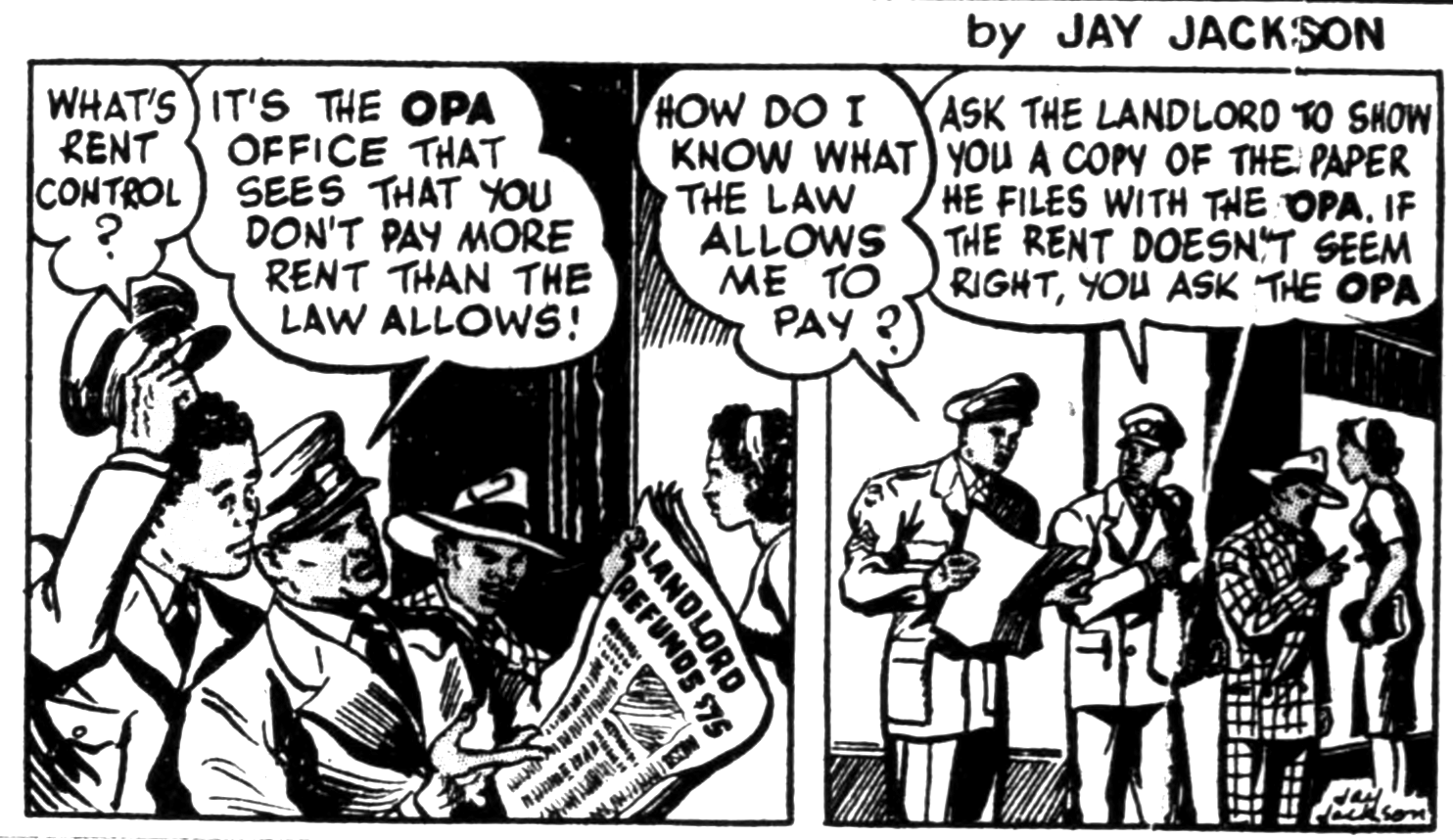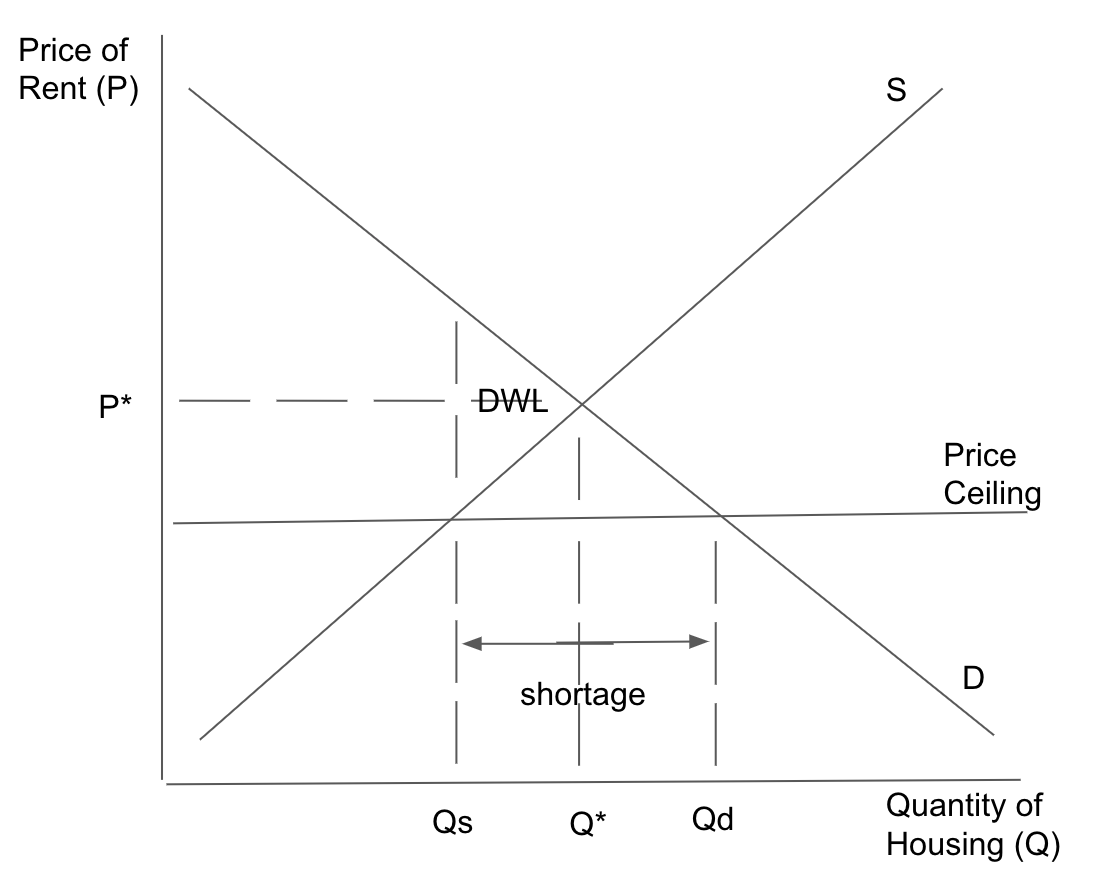
Chris Powell: Why would anyone want to build inexpensive rental housing?
A 1945 comic explaining World War-era rent control under the U.S. Office of Price Administration.
MANCHESTER, Conn.
Exclusive zoning may not be the only reason that little inexpensive rental housing is being built or renovated in Connecticut. Anyone interested in the housing issue would do well to read the fascinating report about a day in housing court published March 5 in The Day of New London. It was written by journalism students from the University of Connecticut.
The court was full of people whose landlords were trying to evict them for chronic failure to pay rent. Some of the delinquent tenants were hard-luck cases. Others were victims of their own irresponsibility in life. An indulgent judge, court mediators and lawyers provided to the tenants by state government tried to arrange payment solutions and forestall evictions.
But most of these efforts were probably impractical from the start. In the end even patient and understanding landlords ended up seriously cheated. Evictions were dragged out for months but not prevented since the tenants simply couldn't or wouldn't pay.
“If you need something," one landlord said, "you can't just take it, like a coat if you're cold. Yet if you take my product -- time, space -- and don't pay, it's not illegal. ... If someone steals from you, you can be made whole. But my product is gone, used, consumed.”
The Day's report indicated just how mistaken the clamor at the state Capitol for rent control is, for the troubled people in housing court often can't pay any rent. They hold on by using the court to expropriate their landlord, sometimes for most of a year.
Rent control would be expropriation. But in housing court expropriation is already policy.
With rent control possibly coming on top of the expropriation any delinquent tenant can arrange in housing court, why should anyone want to get into the less-expensive rental business in Connecticut, even if exclusive zoning is overthrown as it should be?
And yet the only solution to the housing problem is to increase supply.
Submarine maker Electric Boat, in Groton, just across the river from New London, plans to hire thousands more workers over the next few years. But no one has announced plans to build thousands of housing units for the new workers to occupy nearby. EB's growth will push housing costs way up.
The problem bigger than the housing shortage is Connecticut's growing population of people not equipped to support themselves and their families -- people who are uneducated, unskilled, and often demoralized. Meanwhile industry in the state is unable to find qualified applicants for tens of thousands of jobs with good salaries and benefits. (Contrary to the premise of public education in Connecticut, giving high school diplomas to people who never mastered their schoolwork doesn't make them educated.)
Many people whose evictions are prolonged in housing court are in effect long-term welfare cases. To reduce evictions during the virus epidemic, state government has reimbursed landlords for some unpaid rents. The program continues but many tenants have exhausted the benefit. Maybe it should be enlarged to become like the Section 8 housing voucher program.
But housing the incapable is government's responsibility, not the responsibility of any landlord. That's why delinquent tenants aren't really the ones expropriating the people who provide rental housing. The expropriating is being done by government.
Is Accountability Illegal?
The dumbest non-sequitur of government in Connecticut is thriving at the top of the state's system of what styles itself higher education.
The Board of Regents for the Connecticut State Colleges and Universities, which runs the community colleges, still refuses to explain what happened with the firing and reinstatement of Manchester Community College CEO Nicole Esposito two years ago. Esposito sued, charging sex discrimination and retaliation for her questioning financial improprieties, and quickly got her job back and $775,000 in damages.
A spokesman for the board says that it won't comment on personnel matters that have been resolved or allegations that have been withdrawn.
But why not? Is accountability illegal in Connecticut now?
No, the law doesn't forbid explaining when so much money has been squandered. Governor Lamont and state legislators should press the point.
Chris Powell is a columnist for the Journal Inquirer, in Manchester (CPowell@JournalInquirer.com).
Chris Powell: Rent-control bill a fraud; college-job racket; nimbys vs. Bridgeport
In a studio apartment.
MANCHESTER, Conn.
Nearly everyone agrees that Connecticut badly needs more inexpensive apartments. Many basic two-bedroom units in the state carry monthly rents that are as high as a home mortgage payment, and rents are still rising. As was demonstrated the other day at a state legislative committee hearing, many renters are desperate, especially with unprecedented electricity price increases coming on top of rent increases.
But no one has explained how a law restricting rents -- government price control that would be exclusive to housing even as the prices of all other necessities are rising sharply as well -- is going to encourage construction and renovation of rental housing. Indeed, with a rent-control law Connecticut may send a powerful signal to rental-housing developers to avoid the state and a powerful signal to landlords to convert their apartments to condominiums and sell them.
Rent control may help people who already have apartments but it won't increase supply or slake demand.
Fortunately the major rent-control legislation under consideration in the General Assembly is a fraud. It would restrict annual rent increases to 4 percent plus inflation. With the latest official U.S. inflation rate at 6.4 percent, the legislation would hardly cap rents at all. Its main value to its advocates may be to establish the principle of expropriating property without fair compensation.
Then, after a few years, other legislation might cap rent increases at 4 percent without an inflation adjustment, and then freeze rents entirely. After all, many advocates of rent control think that everything necessary should be free. Of course nothing is really free, and decisions about who should pay can be messy, since cost-shifting is such a big objective of government.
Many people oppressed by their rents aren't familiar with economics and how the real world works. But many advocates of rent control are, and they know exactly what they are doing and what they are not doing.
They are not encouraging the crowd to understand inflation and where it comes from -- government itself. They are not encouraging the crowd to notice that since most important prices have risen sharply, landlords aren't to blame.
Nor are the rent-control advocates concentrating on the only solution to rising rents: increasing housing supply. No, expropriating is their objective.
There are solutions to supply, but they aren't quick and easy.
Liberalizing municipal zoning is the one most discussed. But any zoning solution will be slow and disjointed.
State government could build housing directly, exempting itself from municipal zoning, using eminent domain to obtain land, hiring contractors, and assigning construction plans, but that would risk much corruption.
Or maybe state government could exempt itself from local zoning, use eminent domain to obtain property near water and sewer lines and transit infrastructure, put the properties out to bid to apartment developers, and then exempt them from taxes as long as the properties were well maintained.
Such a policy would be sounder environmentally and possibly less controversial than putting apartments in rural towns that lack infrastructure.
But there can be no substantial construction of housing anywhere without controversy. In the end the issue is a choice between the haves and have-nots. Government may try to mollify the have-nots with free bus rides, diapers, and contraceptives, but what they need most is less expensive housing.
* * *
In the meantime state government will continue to take care of itself better than anything else.
Central Connecticut State University, in New Britain, has just announced its hiring of former Hartford Democratic state Rep. Edwin Vargas as the new occupant of the Gov. William A. O'Neill Endowed Chair in Public Policy and Practical Politics. The job pays $69,000, pretty sweet for someone who is 74 with pension income. That’s "practical politics" for you.
Vargas won re-election last year but, betraying his constituents, declined to take office in January so he could accept the university job. His predecessor was another state legislator, former state Sen. Donald J. DeFronzo, a Democrat from New Britain.
If Republicans ever want to occupy an endowed chair in public higher education in Connecticut, they'll have to start winning a lot more elections.
View of Sikorsky Memorial Airport (left), the Housatonic River and Stratford. The airport is named for aviation pioneer Igor Sikorsky (1889-1972).
No place in Connecticut has as much untapped potential as its largest and most impoverished city, Bridgeport -- on Long Island Sound with a great harbor, superhighways leading to the east, west and north, a major stop on the Northeast Corridor railroad line, and a city-owned airport just over the municipal line in Stratford.
But state government long has overlooked Bridgeport's potential because no one in authority has dared to deal with the poverty of the city's residents.
Refurbishing the airport and restoring scheduled commercial flights there could contribute greatly to Bridgeport's revival and economic development. But predictably enough Stratford doesn't want to cooperate. Two of its state legislators, Republican Sen. Kevin Kelly and Democratic Rep. Joe Gresko, have introduced legislation to thwart Bridgeport's sale of Sikorsky to the Connecticut Airport Authority, essentially giving Stratford control of the airport, which would mean no improvement.
Bridgeport is too poor and ill-managed to restore Sikorsky itself. But it could be done by the airport authority, which has greatly improved Bradley International Airport in Windsor Locks. If Bridgeport is ever to be improved in any respect, state government will have to do it. Let it start with Sikorsky.
Chris Powell is a columnist for the Journal Inquirer in Manchester, Connecticut. (CPowell@JournalInquirer.com).
Chris Powell: Rent control worsens housing shortage; teacher union greed
A price ceiling will create a shortage in between Qs and Qd.
— Photo by Karinnna13
MANCHESTER, Conn.
Connecticut may have had its "All power to the Soviets!" moment the other day as more than 200 people summoned by the Democratic Socialists of America gathered on the Internet to call for a law to limit residential rent increases to 2½ percent annually. Five Democratic state legislators have co-sponsored the legislation and thus have tainted themselves with its demagogic scapegoating, its accusation that landlords are uniquely responsible for inflation.
"Our rent increases every year and our incomes do not," a tenants union activist said -- an excellent point immediately discredited by the failure to acknowledge the wider world.
That is, real wages throughout the country long have been falling behind inflation in all important respects -- not just the cost of housing but also food, electricity, gasoline, medicine, education and other essentials.
So where is the legislation to limit those costs?
Such legislation can't be introduced without exposing the scapegoating being done to the landlords, nor without revealing that a substantial percentage of inflation is caused by government itself as its creation of money far outstrips the production of goods and services.
While Connecticut has a severe shortage of inexpensive rental housing, the rent-control legislation has just struck a powerful blow against efforts to get more such housing built or renovated.
For what housing developer or landlord will want to risk his money building or renovating apartments when state government may prohibit him alone from fully protecting himself against inflation?
Under the rent-control legislation, everyone else in commerce will remain free to raise prices by any amount to cover himself against inflation, and apartment tenants will be free to demand higher wages in any amount. But the rental-housing business will be strictly limited to price increases far below the inflation rate.
The result of this will be still more scarcity inflating housing prices. Under rent control housing providers will be effectively expropriated by inflation.
That's "democratic socialism" for you -- diverting the blame from government without ever solving the problem government itself caused. Whom will the "democratic socialists" scapegoat next?
xxx
Guess how Connecticut's teacher unions want the state budget surplus distributed.
It's not to do anything compelling. No, the teacher unions want to use the surplus to increase their members' pay, which is already nearly the highest in the country.
Connecticut does have a problem with teachers, as it does with police officers. As social disintegration worsens, especially in the cities, fewer people want to teach where as many as half the students are chronically absent and many misbehave, and fewer people want to work in law enforcement where respect for law has collapsed.
As a result many teachers and police officers in the cities have been leaving for jobs in the suburbs, where social disintegration isn't as bad and they are paid more for easier work.
But that is no reason to increase compensation for teachers generally. It is a reason to increase salaries for teachers where more teachers are most needed particularly -- and not just in the cities but in particular subjects.
Typically, teacher union contracts won't allow that. So any new state money addressing the teacher shortage should be exempt from union contract restrictions.
Any new money also should come with audit requirements to determine if the money improves student performance, which is so bad in the cities that no additional spending is likely to accomplish anything unless it hires parents for the kids.
xxx
The Board of Education in Bridgeport, whose schools long have been in turmoil and whose students perform terribly, wants to hire a public-relations company. According to the Connecticut Post, the company would "manage the district's reputation, provide risk mitigation and consultation services, develop a crisis response plan, and train administrators in crisis communications."
It's as if the board has never heard that to change the image, it's necessary to change the reality. But then all Connecticut seems to have given up on changing the cruel reality of its cities.
Chris Powell (CPowell@JournalInquirer.com) is a columnist for the Journal Inquirer, in Manchester.






